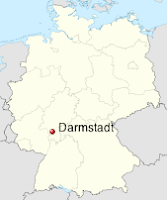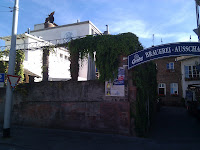 Unless you're a WWII historian, a composer, or one of the 145,000 residents, chances are you haven't heard of this small German college-town. Roughly 30 km outside Frankfurt in Hessen, Darmstadt lacks many of the quaint characteristics of nearby Heidelburg due to the fact that it was destroyed during a British bombing raid in 1944. Like many German towns that shared a similar fate, when Darmstadt rebuilt after the war it opted for a relatively plain architecture that was efficient and practical.
Unless you're a WWII historian, a composer, or one of the 145,000 residents, chances are you haven't heard of this small German college-town. Roughly 30 km outside Frankfurt in Hessen, Darmstadt lacks many of the quaint characteristics of nearby Heidelburg due to the fact that it was destroyed during a British bombing raid in 1944. Like many German towns that shared a similar fate, when Darmstadt rebuilt after the war it opted for a relatively plain architecture that was efficient and practical.Despite this, Darmstadt happens to be the home of one of the world's most important New Music festivals in the world. Founded in 1946 by Wolfgang Steincecke, the Internationale Ferienkurse für Neue Musik, Darmstadt has been the summer home for many of the world's most important composers including Stockhausen, Boulez, Henze, Varèse, Xenakis, Ligeti, and others. These courses are so significant, that the "Darmstadt School" actually refers to a particular style of musical composition that is explored in every modern textbook on music history. Ironically, the young composers of the world probably know more about Darmstadt then most of the residents living there.
Like several other hundred composers, I too descended upon Darmstadt in mid-July to hear some amazing new compositions. This wasn't my first time in Darmstadt: my wife, due to uncanny coincidence, has been singing for the Darmstadt opera for the past couple years. As such, I've gotten to know both the city and its beers pretty well.
Darmstadt can boast three breweries: Darmstädter Privatbrauerei, Darmstädter Ratskeller Hausbrauerei, and Grohe Brauerei. Darmstädter Privatbrauereri (or just Darmstädter) is the town's requisite macro-brewery. It is everywhere in the city, and quite literally more easily available (and less expensive) than water. Darmstädter is served at nearly every bar and during intermission of every concert.
 |
| Photo by Sven Rumbler & Google Earth |
Darmstädter brews fourteen different beers which include two different alcohol free beers, two Radlers (a "mixed drink" that is half lemonade and half Pilsener), a couple of seasonals, and then a smattering of different Pilseners and Wheat Beers. The most common of their beers are the two Pilseners (Braustüb'l Pilsner and Darmstädter), though their Weissbier is pretty commonly seen as well.
Generally speaking, Darmstädter beers are pretty dull, uninteresting, and lack any true character or identity. They are easy drinking and unoffensive which is exactly what the average German beer-consumer enjoys. It's beer for the masses.
 Darmstädter Ratskeller Hausbrauerei (or just Ratskeller) is a lovely brewery in the Marktplatz right in the center of town. If Darmstadt were a tourist town, I'd say this was the town's tourist brewery. It's cute with exposed brew kettles, serves quality German food, and is always crowded. It's definitely best to visit in the summer when there is outdoor seating: inside can get a bit cramped and there is often no space at the tables.
Darmstädter Ratskeller Hausbrauerei (or just Ratskeller) is a lovely brewery in the Marktplatz right in the center of town. If Darmstadt were a tourist town, I'd say this was the town's tourist brewery. It's cute with exposed brew kettles, serves quality German food, and is always crowded. It's definitely best to visit in the summer when there is outdoor seating: inside can get a bit cramped and there is often no space at the tables. Ratskeller has three year-round beers: a Hefeweizen, a Pilsener (pictured at right), and the "Spezial" Dunkler. And though I have never had it, I am told they also brew a Doppelbock that is available for about four weeks up to December 23rd.
Ratskeller has three year-round beers: a Hefeweizen, a Pilsener (pictured at right), and the "Spezial" Dunkler. And though I have never had it, I am told they also brew a Doppelbock that is available for about four weeks up to December 23rd.The Dunkler is the least interesting of the three beers being generally refreshing with a slight hint of caramel. The Hefe is a lovely beer with a lot of lemon citrus and banana flavors and a nose that borders on a Belgian Wit. The Pilsener ranks, in my opinion, as the best Pilsener in town. Pouring beautifully with tremendous foamy head, it's crisp and clean with a good but mild noble hop presence, and a bit of a mineral bite. And on a hot summer day sitting on the outside terrace, it's tough to beat. Ratskeller's beer is only available at the brewery, and they do not bottle.
 The Grohe Brauerei (not to be confused with the Grohe toilet company!) is easily the best overall brewery in town. It's a little off the main-path with a beer garden that is enclosed by a wall. In fact, if one doesn't know what to look for, it's pretty easy to pass. The food is excellent: traditional German fare, the wurst is among the best I've had and the flammkuchen is spectacular.
The Grohe Brauerei (not to be confused with the Grohe toilet company!) is easily the best overall brewery in town. It's a little off the main-path with a beer garden that is enclosed by a wall. In fact, if one doesn't know what to look for, it's pretty easy to pass. The food is excellent: traditional German fare, the wurst is among the best I've had and the flammkuchen is spectacular.
 Like the Ratskeller, Grohe also serves three beers (a Hefe, a Pils, and a seasonal beer) and a lemon-lime soda. The seasonal is a Märzen and an excellent one at that: darker in color but crisp and clean, there is a slightly sour tinge to it that is wonderfully thirst-quenching. The Hefe is very similar to that at the Ratskeller, however it has a little more clove spiciness that gives it just that little extra bit of depth. However, as good as the other two beers are, the Pils is a huge disappointment: pouring with no head, it's unusually sweet and syrupy, nothing like what a Pils could and should be. It was so off, it left me wondering if there was something wrong with the tap lines. Grohe does bottle their beer, and these beers can be found in various liquor stores and gas stations in town. Their beer is also available at select restaurants in the area.
Like the Ratskeller, Grohe also serves three beers (a Hefe, a Pils, and a seasonal beer) and a lemon-lime soda. The seasonal is a Märzen and an excellent one at that: darker in color but crisp and clean, there is a slightly sour tinge to it that is wonderfully thirst-quenching. The Hefe is very similar to that at the Ratskeller, however it has a little more clove spiciness that gives it just that little extra bit of depth. However, as good as the other two beers are, the Pils is a huge disappointment: pouring with no head, it's unusually sweet and syrupy, nothing like what a Pils could and should be. It was so off, it left me wondering if there was something wrong with the tap lines. Grohe does bottle their beer, and these beers can be found in various liquor stores and gas stations in town. Their beer is also available at select restaurants in the area.If you are going to be traveling to Germany, Darmstadt is not a town I would generally recommend going out of your way to visit. Though both Grohe and Ratskeller serve fantastic beers, while they are the best beer in the area, they certainly aren't among the best in the country. However, if you are nearby and travelling through – perhaps from Frankfurt to Heidelberg – I would encourage a short stop-over to taste some pretty good examples of German cuisine and beer styles. And if you stop by Grohe, tell Viktor that I say hello!
Prost!
-keith
No comments:
Post a Comment